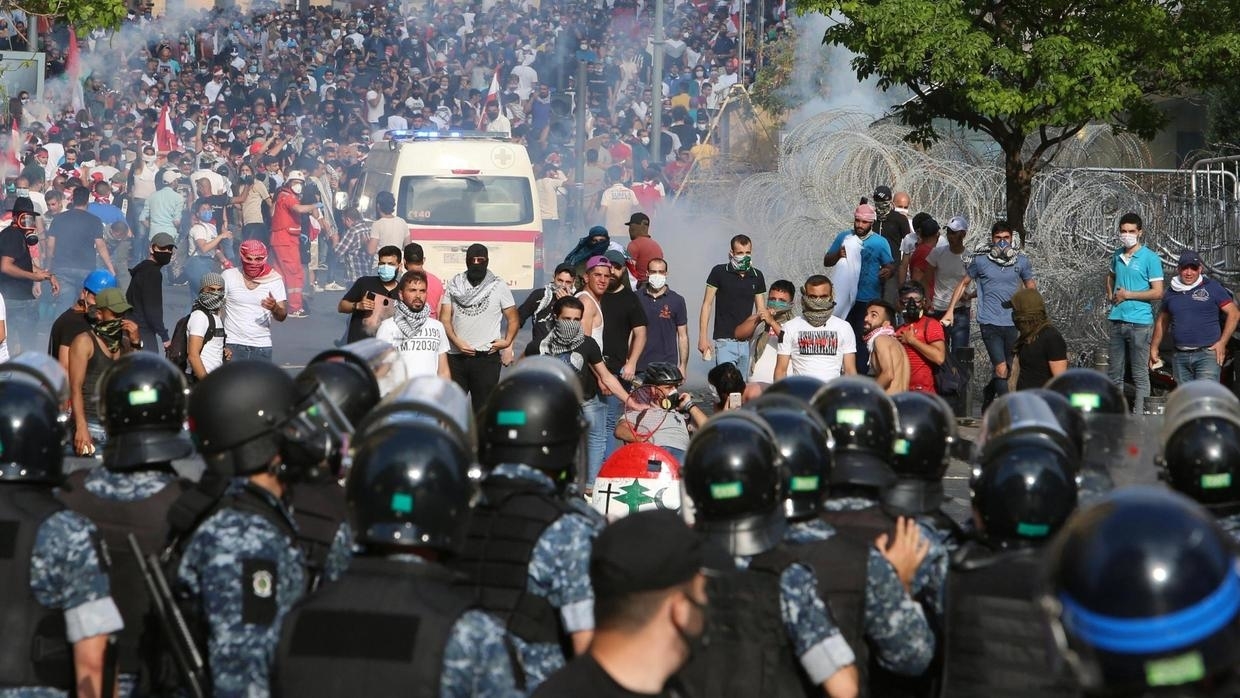As coronavirus restrictions are being relaxed, the government must declare sectarianism as its number one public health emergency.
Following the government’s decision to ease coronavirus lockdown measures, people took to the streets once again in protest over corruption and economic mismanagement in the latest round of the anti-government protests that kicked off in October of last year. It comes at a time when the country is negotiating with the IMF hoping to secure an $8.5bn bailout package to rescue its collapsing economy.
On the day of the protest, clashes erupted between Shia supporters of Amal and Hezbollah, anti-government protesters, and Lebanese Forces and Kataeb protesters who chanted slogans calling for the disarmament of Hezbollah. Skirmishes then broke out on the streets of Beirut after a video went viral of Hezbollah and Amal supporters hurling insults at a historic Sunni figure which led to Sunni residents flooding the streets and blocking roads.
A stand-off was also reported in a Shiia-Christian area associated with the start of the civil war of 1975–1991, promoting security forces to be deployed to Chiyah–Ain el Remmaneh. Religious figures –as always– rushed to appeal for calm, denounce violence and warn against falling into the trap of sectarianism. Similar clashes have taken place in the past with scenes of loyalists to Hezbollah and Amal destroying the main protest camp in central Beirut despite the protests being overwhelmingly peaceful, representative of a cross-section of the society and inclusive of all sects.
A lot of debate has been centered lately about the need to turn Lebanon’s peaceful demonstrations into violent ones amid a power struggle that has thus far failed to bring about tangible change in the midst of a dwindling economy.
It is argued that violence is the inevitable consequence of radical change. Some public figures in Lebanon have been openly advocating for violence as a tool of resistance, citing the use of tactical force similar to the riots that have gripped US cities in protest over the killing of the African American George Floyd by a police officer.
This swirling rhetoric of violence comes after months of peaceful protests in Lebanon had failed to initiate substantial reform –let alone invoke real change. The coronavirus has been used as a pretext for extending lockdown measures viewed as an attempt to stifle dissent and quell public anger and frustration.
Historically, it has been argued that social change cannot happen without aggression and that the use of violent force is necessary to realize substantive change. Some scholars conclude that looking back at US history, all social movements from slavery to racism, securing labor to gay and transgender rights were only achieved by means of violent resistance. The US history is rife with non-peaceful resistance including the 60s civil rights movement, embodied by Martin Luther King whose resistance is thought to have been sanitized as non-violent. Despite being largely hailed for its non-violent tactics, the civil rights movement, some argue, was far from peaceful.
Regardless of which side of the history one chooses to stand on, African American struggle is rooted in decades of peaceful protests in the face of systematic social and economic marginalization and scores of unarmed civilian deaths. 150 years after the abolition of slavery, their struggle is truly an inspiration for social change.
Calls for the incitement of violence in Lebanon must look upon this movement in its entirety for being overwhelmingly peaceful despite enduring grave injustice and inequality. Understanding Black history provides much needed context to the current conversations in Lebanon as the public looks for parallel struggles in the fight for universal human rights.
Almost 30 years after the end of the civil war, Lebanon cannot endure any form of violent resistance. Violence only breeds violence in a country that is intrinsically divided along sectarian lines. What happened last week is just an example of a situation spiraling out of control pitting one street against the other, and one brother against the other. The question then becomes, if violence is not the way to achieve social progress, then what is?
Incremental change happens by being united as one in the face of an unrelenting regime that feeds off a divided nation.
The notion that social change and violence are inextricably intertwined must be dispelled particularly in a context like Lebanon. Eradicating sectarianism in a nation founded on a power-sharing system between various sects is Lebanon’s only hope for social and political change.
Lebanon’s political struggles do not take the shape of police brutality, nor do they take the form of systematic discrimination –the likes of which we see in the US. Lebanon’s ills are embodied in a system that pits its citizens against each other, as it strives from people’s ideological, political and sectarian divides. The image of the army being deployed onto the streets of Lebanon to thwart clashes between citizens on different sides of the political aisle during an anti-government protest, stands in contrast to that of the US where Trump came to the brink of ordering active-duty military troops to intervene against protesters in Washington as they stood together, side by side.
Looking at these contrasting images, one realizes that so long as people are divided, there’s little hope to beat a system that thrives on sectarian tensions –much less be capable of igniting any change by use of force. Despite an innate tendency to draw on “inspiring” movements wherever they existed, one should be wary of being drifted by social movements and reducing them to one single event in a nation’s long fight for freedom.


